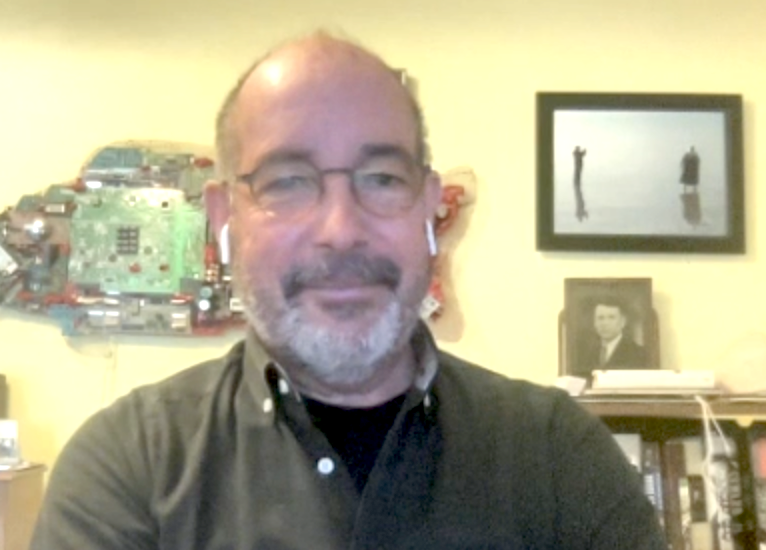
WASHINGTON — From one vantage point, Bureau of Alcohol, Tobacco, Firearms and Explosives agent Jay Dobyns still worries about the Hells Angels coming after him. From another, it’s his employer he’s more concerned about.
Dobyns infiltrated the Hells Angels from 2001 to 2003 in Arizona and wrote a New York Times best-seller about it last year. But now he’s locked in major legal fisticuffs with the ATF.
A $4 million lawsuit filed by the 23-year ATF veteran says the agency failed to abide by a 2007 written contract to protect him and his wife and two children against death threats from the Hells Angels. The suit, unfolding now in the U.S. Court of Federal Claims, also says the agency failed to stop subjecting him to a hostile work environment for complaining about his safety.
In August 2008, Dobyns’ Tucson, Ariz., home burned to the ground in an apparent arson. Two months later, he filed the breach of contract lawsuit. He currently lives out West with his family and works for the ATF as a program manager in the National Integrated Ballistic Information Network.
“I honestly think at this point ATF has no idea how to handle threats against employees,” the 48-year-old agent said in a phone interview with AOL News. “Their solution is to write a check and transfer the agent.”
“I’ve been harassed since I voiced a complaint with the agency that they were ignoring their obligations” to protect him and his family, he said.
On Jan. 15, Judge Francis Allegra ruled that the breach-of-contract case should move forward. The Justice Department and the ATF filed a counterclaim two weeks later saying it was Dobyns, not the government, who was in violation of the contract and asking that the case be dismissed.
The counterclaim said Dobyns had violated agency rules by failing to get permission before he published a book in 2009, “No Angel: My Harrowing Undercover Journey to the Inner Circle of the Hells Angels,” and signed movie rights with MGM. The Justice Department has asked the judge to rule that Dobyns must forfeit all the proceeds from his outside projects to the government.
Dobyns insists he had been given approval.
The ATF declined comment. A Justice Department spokesman said today that the department had no comment.
The fall from hero to heel in the ATF came in measured steps. In 2001, Dobyns, with shaved head and a generous stream of tattoos, went deep undercover — meaning he stayed in character 24/7 and didn’t go home at the end of the day. He infiltrated the Hells Angels in what was called “Operation Black Biscuit.”
“I wanted to do it,” he recalled. “No one held a gun to my head. I jumped at the job.”
From 2001 to 2003, he barely saw his wife and two children. Every day was frightening, he said.
“Absolutely. You have never-ending paranoia: ‘Have I made a mistake that I’m not even aware of?’ These are violent dudes, and if they find out that you’ve betrayed them, they’re going to put a box cutter to your throat and that’s the end of that.”
The gang was about to make him an official member, he said, after he and a colleague staged a fake murder of a rival bike gang member. Instead, the probe ended with indictments of more than a dozen Hells Angels. The charges ranged from murder to rape.
The prosecution was less successful. Some pleaded guilty, and lesser sentences were handed down. In some cases, the charges were dismissed altogether. Dobyns said internal disputes between prosecutors and the ATF over presenting evidence and exposing informants weakened the case.
After coming out of the deep undercover role, Dobyns said he became the ATF’s “golden boy” for his heroic work. But when he started complaining about the ATF’s lax response to threats, he suddenly became a malcontent and traitor.
The first reported threat came in 2004, according to his lawsuit, when a Hells Angel member in Tucson saw him on the street and said that he knew where Dobyns lived, that he had a wife and kids and that he was “going to get hurt.”
The same year, the suit says, a confidential source had a cellmate in Arizona, a Hells Angel whom Dobyns had put away, who wanted to murder Dobyns. In another instance, Dobyns said, prison officials intercepted a letter from a gang member who said he wanted to rape Dobyns’ wife and make Dobyns watch the videotape before he killed him.
Dobyns wanted the ATF to act, but he said the agency told him not to worry and that the man was behind bars.
“ATF didn’t not only knock on the guy’s jail bars, they ignored it,” he said. “Their response to me was ‘Don’t worry about it, this guy is locked up.'”
Dobyns said his reaction was “Are you kidding me? This guy has connections on the outside.”
By contrast, he said, the FBI would send someone to top mob guys after undercover agents were done with a case and say, “Those are our guys. They’re hands off. They better not receive a call at the house.”
Dobyns filed grievances internally, complaining of ATF’s lax response to the threats. He said the government moved him four times. He moved an additional seven times with his family at his own expense, “hoping to break the paper trail as to where I was at.”
Allegra, in his January ruling, noted that the Office of Inspector General at the Justice Department “opined that ATF should have taken threats against Agent Dobyns and his family ‘more seriously'” and that the agency “needlessly” delayed responding to them.
In 2007, ATF entered into a contract with Dobyns that promised to provide better protection and a hostile-free environment. It also agreed to give him $373,000 for all his troubles.
The next year, his Tucson home burned down at 3 a.m. one August night. His family escaped unharmed. He was in Phoenix at the time. In his suit, he says the ATF took over the case from the local sheriff’s department, but it did hardly anything before turning over the matter to the FBI.
Dobyns is quite certain it was the work of the Hells Angels. Since then, he said, he hasn’t received any real threats.
“I have concern for my life,” he said. “I’ve seen firsthand the violence and intimidation. I lived with it. I do not underestimate them. I don’t slough them off. But if I allow them to have me live in fear, then they’ve won. Then I’m Osama bin Laden living in the cave.”
As for his $4 million lawsuit, he said, “There’s not enough money in ATF’s budget to repay me for how my family has suffered.”





